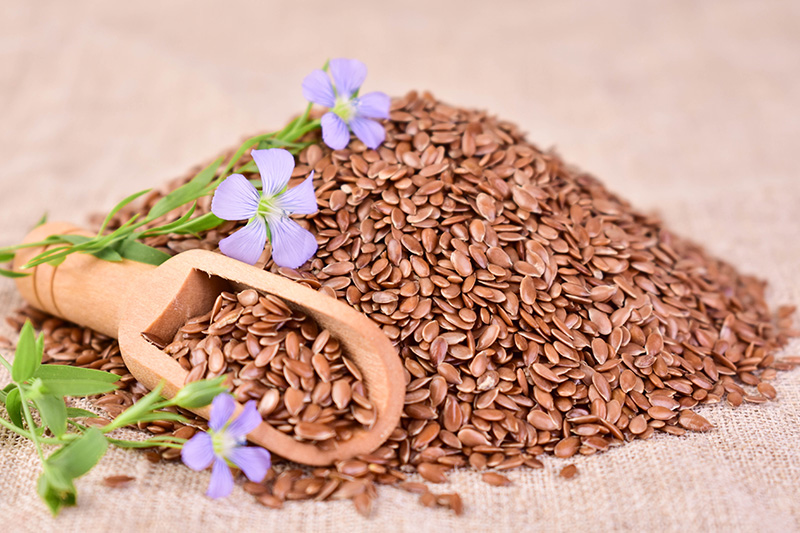Flax Seeds Benefits
Flax seeds have many benefits and are often hailed as a superfood and have been used for thousands of years. Packed with nutrients, these tiny seeds offer a wealth of potential advantages, making them a staple in the diets of health-conscious individuals. Rich in omega-3 fatty acids, fiber, protein, and lignans (a type of antioxidant), flax seeds are considered one of the most nutrient-dense plant-based foods. Their mild nutty flavor makes them versatile in various dishes, from smoothies to baked goods.
- Rich Source of Omega-3 Fatty Acids: Flax seeds are one of the best plant-based sources of alpha-linolenic acid (ALA), an essential omega-3 fatty acid that supports heart health, reduces inflammation, and promotes brain function.
- High in Dietary Fiber: The seeds are loaded with both soluble and insoluble fiber, which aid in digestion, support gut health, and help regulate blood sugar levels.
- Packed with Lignans: Flax seeds contain lignans, plant compounds with antioxidant properties that may reduce the risk of hormone-related cancers and improve hormonal balance.
- Supports Heart Health: Regular consumption of flax seeds has been linked to lower blood pressure, improved cholesterol levels, and reduced risk of heart disease.
- Aids in Weight Management: The fiber in flax seeds promotes a feeling of fullness, which can help control appetite and support weight loss efforts.
- Improves Skin and Hair Health: Flax seeds’ omega-3 fatty acids and antioxidants contribute to glowing skin and stronger, healthier hair.
- Helps with Hormonal Balance: Flax seeds may help alleviate symptoms of menopause and support overall hormonal health, especially in women.
These benefits make flax seeds a valuable addition to a balanced diet, but it’s essential to consume them in appropriate quantities.
What Are Flax Seeds?
Flax seeds, also known as Linum usitatissimum, are small, flat, and oval-shaped seeds in two primary colors: golden and brown. These seeds are derived from the flax plant, grown in temperate climates worldwide. While flax seeds are prized for their nutritional content, the plant is also cultivated for its fibers, which produce linen fabric.
Historical Uses of Flax Seeds
Flax seeds have a long history of use, dating back to ancient civilizations. They were cultivated as early as 3000 BCE in Mesopotamia and Egypt, where they were valued for their versatility.
- In Ancient Egypt: Flax seeds were used for their nutritional value and role in linen production. The Egyptians used flax fibers to create linen garments, while the seeds were consumed as a source of energy and nourishment.
- In Ayurveda and Traditional Chinese Medicine: Flax seeds were used to remedy digestive issues, inflammation, and skin conditions. They were also believed to balance bodily energies and improve overall health.
- In Greek and Roman Cultures: Ancient Greek physicians, such as Hippocrates, praised flax seeds for their medicinal properties, particularly for relieving gastrointestinal discomfort.
- In Early European Agriculture: Flax was one of the first crops to be domesticated, with seeds used for dietary and medicinal purposes.
The long-standing use of flax seeds underscores their versatility and enduring appeal as a functional food.
What Forms Do Flax Seeds Come In?
Flax seeds are available in various forms, offering flexibility in incorporating them into your diet or health routine. Each form has benefits, and the choice depends on personal preferences and dietary needs.
- Whole Seeds: These can be added to baked goods, smoothies, or oatmeal but may need to be ground for better nutrient absorption.
- Ground Flax Seeds (Flaxseed Meal): This form is easier to digest and is commonly used in recipes or sprinkled over foods.
- Flaxseed Oil: Extracted from the seeds, flaxseed oil is rich in omega-3 fatty acids and is used as a dietary supplement or in salad dressings.
- Capsules and Softgels: These provide a convenient way to consume flaxseed oil or extract for those who prefer supplements.
- Flaxseed Powder: Often included in protein powders and nutritional blends for added health benefits.
- Flaxseed Flour: Used as a gluten-free alternative in baking and cooking.
What Should Not Be Taken with Flax Seeds?
Flax seeds can interact with certain substances, which may diminish their effectiveness or lead to unwanted side effects. Here are some combinations to avoid:
- Blood Thinners: Flax seeds contain omega-3 fatty acids, which can increase the risk of bleeding when combined with anticoagulants like warfarin.
- Laxatives: Due to their high fiber content, consuming flax seeds with laxatives may lead to excessive bowel movements or dehydration.
- Medications for Diabetes: Flax seeds can lower blood sugar levels, which may interfere with medications that regulate blood glucose.
- Hormonal Medications: The lignans in flax seeds mimic estrogen and may interfere with medications for hormone-sensitive conditions.
Always consult a healthcare provider before adding flax seeds to your diet if you are on medication.
Who Should Not Take Flax Seeds?
While flax seeds are generally considered safe, certain individuals should exercise caution or avoid them altogether:
- Pregnant and Breastfeeding Women: The hormonal effects of flax seeds may not be suitable during pregnancy or lactation.
- People with Gastrointestinal Issues: High fiber content can aggravate conditions like irritable bowel syndrome (IBS) or other digestive disorders.
- Individuals with Allergies: Those allergic to flax seeds or related plants should avoid them.
- People with Hormone-Sensitive Conditions: Flax seeds’ estrogen-like effects may exacerbate conditions such as breast cancer or endometriosis.
- Children: Due to limited research, flax seeds are generally not recommended for children in large quantities.
Nutrient-Packed Powerhouse
Flax seeds are a nutrient-packed powerhouse with a long history of use in traditional medicine and modern health practices. Their benefits include improving heart health and aiding digestion, supporting hormonal balance and weight management. Whether you sprinkle them on your morning oatmeal, blend them into smoothies, or take them as a supplement, flax seeds are a simple yet powerful way to enhance your overall health.


Use Coupon Code: FREE
*Sorry, coupons can't be combined.